By: Ali Farkhan Tsani, Al-Quds Ambassador, Senior Editor of MINA News Agency
A controversial plan put forward by the Israeli occupation for the past year is to build a cable car across the Old City of Jerusalem. This program is called the “green cable car”.
The program has many challenges, so there are those who submit it to the Israeli Supreme Court. This case is being handled by the Supreme Court.
According to the Israeli occupation, there are several reasons for the need to hold this cable car because of the rapid increase in tourist arrivals in the last five years.
Also Read: Over 170 NGOs Demand End to Israeli Military-Controlled Aid Distribution in Ga
One reason is to overcome traffic congestion due to the dense tourism vehicles in the heart of Jerusalem, where millions of people come to visit some of the holiest sites in the world for Christians, Jews and Muslims.
Another reason is reducing air pollution from the exhaust fumes of vehicles that are steaming especially when congestion.
The next reason is to facilitate access in the southeastern region of Jerusalem.
Israeli Tourism Agency said there were around 4.5 million people visited the occupied territories last year. Many of them joined the Jerusalem tour guide who dropped passengers at one of Jerusalem’s seven open gates, to avoid traffic jams.
Also Read: UNRWA Calls for End to GHF’s Operations, 500 Gazans Have been Killed
Israel sees the cable car as a major component, with planned trips that can carry around 3,000 people per hour on each track.
The route is 1.4 km long, from West Jerusalem as the initial station, which has bars and restaurants, and Dung Gate in the northeast. There will be a second stop before going up the hill to the grass and down at Mount Zion.
After the station at the top of the hill, the cable car will begin the most controversial part, namely towards East Jerusalem, where the Aqsa Mosque stands, passing through the Silwan area, which is located just south of Al-Aqsa.
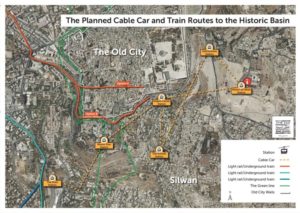
Also Read: Hamas Calls for Mass Mobilization to Defend Al-Aqsa Mosque
Opposed
Infrastructure projects in the area have certainly been strongly opposed by Palestinians, who see East Jerusalem as the country’s future capital.
Local residents, in Silwan, also insisted the project could not be continued.
“It will disturb residents. Where will the train cross? On top of the house, right? ” Ask Shawky, as mentioned in The Tuesday Post edition (2/25/2020).
Also Read: Israel Destroys 74 Percent of Gaza’s Telecom Infrastructure
According to the 52-year-old man, the area to be passed by the cable car according to plan, is a residential area, not a place for tourists to go. There are other places where they can do it.
Not to mention, underground excavations as a further attempt by Israel to claim historical ownership of land around Jerusalem.
Bayan Abbasi, Coordinator of the Madaa Silwan Creative Center, said that the Israeli occupation authorities are trying to control the underground and also the sky now, through the cable car project.
“I think that’s the wrong idea, because it will be above our house, so there will be no privacy,” he said.
Also Read: Dozens of Israeli Settlers Storm Al-Aqsa Mosque Under Heavy Police Protection
While the Ministry of Tourism and the Israeli Development Authority in Jerusalem, has prepared a project budget of $ 60 million (more than Rp. 838 billion).
Israel insisted, the project as an important milestone in promoting Jerusalem and strengthening its status as the capital of world tourism.
The occupation authorities described the cable car as a green project that would deal with traffic in the hills of Jerusalem.
The project was given the green light from the Israeli Housing Committee in November 2019. A move that Palestinian high official Hanan Ashrawi described as an “illegal attack.”
Also Read: Palestinian Resistance Claims Israeli Casualties in Southern Gaza Ambush
The cable car proposal is currently being handled by the Supreme Court.
The non-governmental organization Emek Shaveh. Led by Emek Shaveh, works to preserve cultural heritage and protect ancient sites as public assets.
Emek Shaveh believes that the committee should not approve the project during the current transitional government. Israeli politics are in turmoil because the election did not produce a majority winning party so it failed to form a new government. Prime Minister Netanyahu’s position is uncertain.
Yonathan Mizrachi, Director of Emek Shaveh, said Silwan residents had also raised their objections to the project. A joint Supreme Court hearing is scheduled for late June.
Also Read: Israeli Military Admits Firing on Palestinians at Gaza Aid Centers
Some reports say, if approved, the cable car will operate by the end of 2020, and will be officially opened in early 2021.
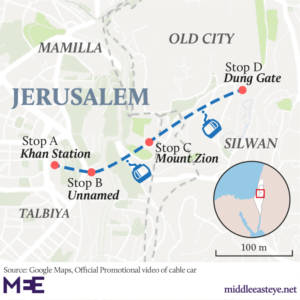
Must Be Stopped
The Chairman of Islamic Highest Commission in the holy city of Jerusalem (Al-Quds), Shaykh Ikrima Shabri, warned to be wary of the cable car project which he said aimed at enforcing Judaization in the Baitul Maqdis region, Jerusalem, and erasing the legacy of Islam there. As will later force eviction of waqaf lands that will be passed by the cable car.
Also Read: Israel Halts Military Purchases Amid Costly War with Iran
“Anyone knows that Jerusalem is based on international law, is an occupied city, and the invaders do not have the right to change the city’s landmarks and damage its holy places,” Shaykh Sabri said.
Another concern is that Israeli occupation tactics want to install a kind of mobile surveillance camera in the name of tourism. So, they freely overseeing every movement below.
“This project is illegal and must be stopped,” he said.
Palestinians themselves will certainly never accept any changes or steps that will be taken by the occupying authorities in the city of Jerusalem.
Also Read: Israel Drone Drops Leaflets Urging Resistance Movement to Surrender
The cable car for tourism has become a new way to strengthen Israeli occupation in the heart of Palestine, as well as a way to connect one Jewish settlement to another Jewish settlement freely without obstacles, and will have a broad gap for demolition of residential housing on the grounds of world tourism projects. (AT/RE1)
Mi’raj News Agency (MINA)
Also Read: Gaza Hospitals Face Imminent Shutdown Amid Critical Shortages






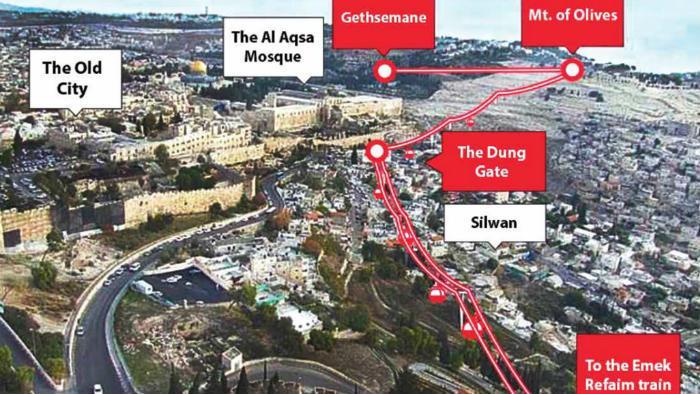





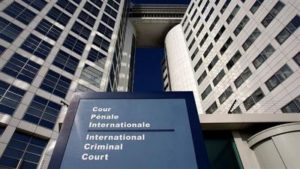


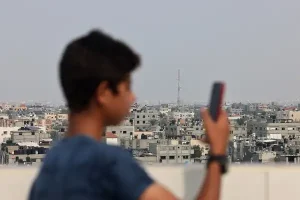


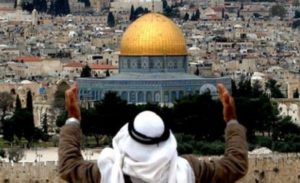
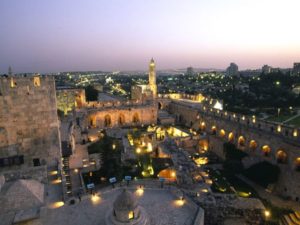







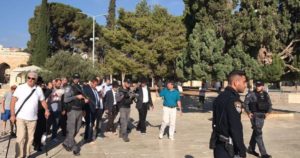





 Mina Indonesia
Mina Indonesia Mina Arabic
Mina Arabic